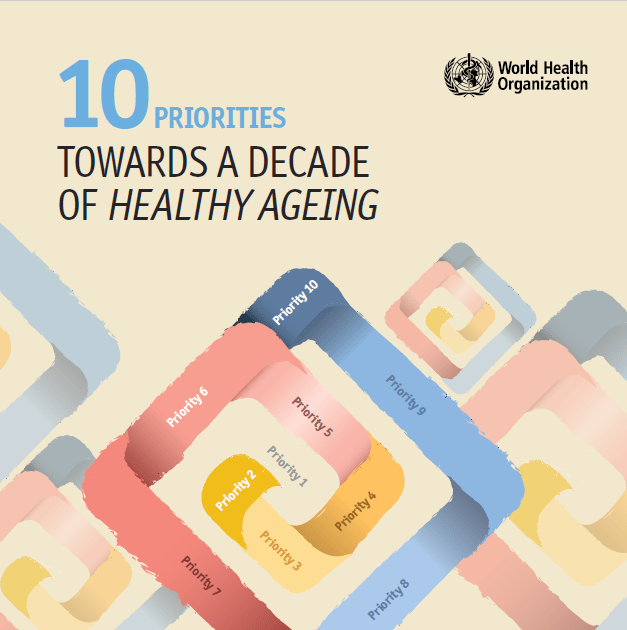Today, most people are living longer and a significant proportion of the world’s population are older people. By 2050, the world’s population of people over the age of 60 will double. This demographic change has strong implications for sustainable development. As people grow older, their health outcomes, needs and what they value can change. Supporting these changes by taking multisectoral action on ageing and health is therefore critical and will support the Decade on Healthy Ageing 2020 – 2030.
Populations around the world are rapidly ageing and this demographic transition will impact on almost all aspects of society. Health is central to our experience of older age. Yet, while we are living longer, there is little evidence to suggest that these extra years are spent in good health.
Moreover, one of the hallmarks of older age is a great diversity of health and functioning. Since this is often a consequence of the cumulative impacts of advantage or disadvantage across people’s lives, policy responses need to be crafted in ways that overcome, rather than reinforce, these inequities.
The 10 Priorities
The 10 Priorities provide the concrete actions that are needed to achieve the objectives of the World Health Organization (WHO) Global strategy and action plan on ageing and health. WHO carried out a series of consultations with experts, WHO staff and key stakeholders to identify those actions that would be transformative. Each priority is crucial for getting the world to the point where it can take on a decade of concerted action. Many are inextricably linked and all will require collaboration with many key partners. Healthy Ageing will not become a reality without focused global action. These ten priorities provide the path forward.

- Priority 1 “Establishing a Platform for Innovation and Change”: Igniting change for Healthy Ageing by connecting people and ideas from around the world
- Priority 2 “Supporting country planning and action”: Countries get the skills and tools they need to create policies that enable people to live long and healthy lives
- Priority 3 “Collecting better global data on Healthy Ageing”: What gets measured gets done – together we collect accurate up-to-date and meaningful data on Healthy Ageing
- Priority 4 “Promoting research that addresses the current and future needs of older people”: Research includes and benefits older people by answering relevant questions in innovative ways
- Priority 5 “Aligning health systems to the needs of older people”: Older adults get the health care they need – where and when they need it
- Priority 6 “Laying the foundations for a long-term-care system in every country”: Older people and care givers get the care and supportcthey need to live with dignity and enjoy their basic human rights
- Priority 7 “Ensuring the human resources necessary for integrated care”: People have the skills to deliver quality health and long-term-care services for older people
- Priority 8 “Undertaking a global campaign to combat ageism”: People have the skills to deliver quality health and long-term-care services for older people
- Priority 9 “Defining the economic case for investment”: Better understanding the costs and opportunities of Healthy Ageing – the starting point for sustainable, equitable and effective responses
- Priority 10 “Enhancing the global network for age-friendly cities and communities”: Cities and communities, around the world, enable older people to do the things they have reasons to value
Read also: New BDO report: “The elderly are not as healthy in old age as expected”
Published by the Editorial Staff on
